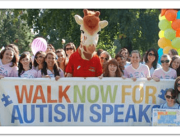Sure, it’s asking a lot for most people to recognize this incurable condition. It’s easy to mistake an autistic child’s uncontrolled “tantrum,” retreat to a corner, or repetitive motions for just a behavior problem. But it seems to be even harder for many people to comprehend why taking services away from innocent children and their families is so devastating.
“Mandate” has become a dirty word, spoken with disdain by politicians, school boards, tax activists and others. In the past several months, reform bodies have readied proposals to reduce state funding for early intervention services, including autism services. Worsening the situation is the fact that cost-cutting at the federal level will also have a negative impact on Medicaid-funded services provided to autistic children, while pressure is on to reduce local transportation costs.
About 1 in 110 Long Island children are diagnosed with autism spectrum disorders, incurable neurobiological conditions affecting the development of communication and social skills. The myriad costly therapies and skill-building activities these kids need are funded through a tangled web of departments and agencies. They aren’t adequately covered by private insurance and are financially well beyond the reach of most families; indeed, I have personal experience with families who have gone broke paying for out-of-pocket costs and essential additional services.
Early intervention programs are under attack in three ways:
State funding: The governor’s budget called for a 10 percent across-the-board cut for all early intervention services, including those for autism. And any cuts would be on top of two consecutive years in which the state budget hasn’t contained an increase for special education programs for children ages 3 to 5, even though operating these mandated programs has become more expensive because of the scarcity of qualified professionals to staff them.
Medicaid reimbursement: More than 38 percent of autistic children statewide are eligible for Medicaid for services like occupational, physical and speech therapy, and psychological, social work and nursing services. Medicaid cuts would result in an additional burden to the counties and state — which would lose the 50-percent federal Medicaid reimbursement, but still be required to fund mandated autism services. This would create further pressure to cut back on those services.
Transportation costs: Efforts are being made to reduce the cost of transportation to school-based special education programs, which can be more expensive than the programs themselves. But, at the same time that Nassau and Suffolk counties are trying to rein in costs, they are also discouraging parents from providing their own transportation by proposing additional rules that would result in parents having to report reimbursements they receive for driving their own children as “income” for tax purposes.
As a result, it’s possible that more children will have to receive services at home. But removing autistic children from the social environment of a school and isolating them is about the worst thing that could happen to them. In addition, in-home services are both more costly and less thorough than those provided in schools.
Thanks to the current system of early identification and special education services, thousands of vulnerable Long Island children have become active members of society and live independently as employed adults.
Clearly, our society cannot give up on these children. We cannot, through a process in which we essentially ration resources, choose between their quality of life and the crushing cost of their care.
Read more and share your comments with Newsday readers at Newsday






Leave A Comment